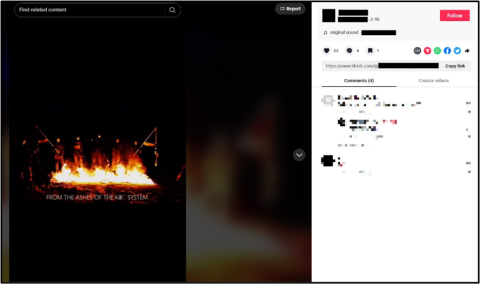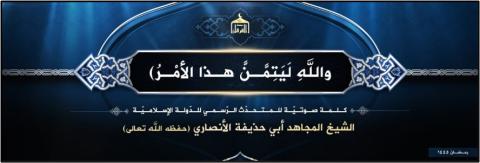(New York, N.Y.) — The Counter Extremism Project (CEP) reports weekly on the methods used by extremists and terrorist groups on the Internet to spread propaganda and incite violence. Last week, CEP researchers identified seven accounts across Twitter, TikTok, and Instagram sharing clips from the Christchurch terrorist attack, all of which were promptly reported to national authorities for further action and were taken down as of April 2.
Also, last week, ISIS released an audio announcement from their spokesperson commemorating the tenth anniversary of the declaration of the caliphate and calling for attacks. Pro-ISIS online propaganda groups, including al-Murhifat Media, al-Battar Media, and Talaea Ansar Foundation, released images celebrating the March 22 attack on a concert hall near Moscow, depicting scenes of violence and encouraging further acts of terrorism.
A pro-al-Qaeda online group released a pamphlet online in French, English, and Arabic, calling for the assassination of French President Emmanuel Macron.
CEP researchers also identified a Telegram channel connected to a Bulgarian-based web shop that offered to create personalized flags for chapters of the white supremacist Active Club movement. Additionally, extreme right Telegram accounts capitalized on the collapse of the Francis Scott Key Bridge in Baltimore last week, focusing on the container ship crew’s ethnicity to spread anti-Indian hate.
Content Containing Clips From Christchurch Terrorist Attack Located on Twitter, TikTok, and Instagram
CEP researchers located seven accounts on Twitter, TikTok, and Instagram that uploaded content containing clips from the Christchurch terrorist attack video. Four accounts were found on Twitter that included a GIF of violent footage from the attack, a 30-second clip, an edited 87-second clip, and a two-minute video with over 500 views.
A TikTok account used a photo of the attacker as a profile photo, quoted the attacker’s manifesto in the bio, and utilized an anti-Muslim slogan as a profile name. In addition, the user uploaded a clip from the attack video with over 2,100 views when found almost four months after it was posted. An account on Instagram uploaded at least three clips from the Christchurch video and footage from the May 2022 Buffalo attack. The seven accounts were all reported to national authorities. All seven accounts were removed from their respective platforms by April 2.
CEP researchers located six additional accounts on TikTok that glorified the attacker and encouraged violence against Muslims. Accounts included photos of the attacker and videos honoring him, neo-Nazi symbols, and an Atomwaffen Division-affiliated propaganda video. CEP reported the six accounts to TikTok on March 27, of which five accounts were still on the website on April 2.
“Users of these social media sites are spreading footage of the Christchurch attack in hopes of inspiring others to commit acts of terrorism against Muslims and others,” said CEP researcher Joshua Fisher-Birch. “Twitter, TikTok, and Instagram need to improve their methods for detecting and removing this content, and ban users who spread it. Individuals are actively encouraging lone actor attacks on these platforms.”

A video from the Atomwaffen Division “Fission” breakaway group on TikTok. Screenshot taken on March 27. The account that posted this video was still on TikTok on April 2.
ISIS Spokesperson Releases Audio Message
On March 28, ISIS’s spokesperson Abu Hudayfah al-Ansari released an approximately 40-minute-long audio message via the group’s al-Furqan media group. The address commemorated the tenth anniversary of the declaration of the caliphate in June 2014. Al-Ansari noted that the organization has expanded from its beginnings in Syria and Iraq to Afghanistan, Pakistan, West Africa, Central Africa, Mozambique, the Sahel region, Somalia, and the Philippines. Al-Ansari also congratulated ISIS fighters in different areas, noting the recent ISIS victories in Mozambique and attacks in Afghanistan against the Taliban, religious minority groups, and the U.S., Russia, and China. He also mentioned the recent attack on a Russian concert hall near Moscow, noting that it was revenge for Russia’s fighting against ISIS in Syria and the Sahel region, and noted the October 31, 2015 attack on a Russian airliner over the Sinai Peninsula.
Al-Ansari also emphasized the importance of pledging allegiance to ISIS’s leader and encouraged translating and spreading the archive of online ISIS propaganda. This content’s global spread was declared secondary in importance only to physical fighting.
The speech also called for attacks to free those in the al-Hawl camp in Syria. Al-Ansari called for global attacks against local allies of the U.S. fighting against ISIS, invoking the Camp Speicher massacre.
Al-Ansari’s previous message was released on January 4, 2024.

Title image announcing al-Furqan audio statement released on March 28.
Online Pro-Al-Qaeda Group Calls for Assassination of French President
On March 30, the pro-al-Qaeda online group al-Kifah Media released a nine-page pamphlet in French, Arabic, and English calling for the murder of French President Emmanuel Macron. The pamphlet stated that the French government had legalized anti-Muslim sentiment and discrimination and defamed the religion. The author mentioned previous attacks on global leaders, such as the assassination of Japanese Prime Minister Shinzo Abe, as examples that the security of world leaders was not impregnable.
Pro-ISIS Online Propaganda Groups Continue to Release Images Celebrating Moscow Attack
Pro-ISIS online propaganda groups continued to release images celebrating the terrorist group’s March 22 attack on a concert hall on the outskirts of Moscow, where at least 143 people were killed. CEP researchers located a dozen images made by the pro-ISIS groups al-Murhifat Media, al-Battar Media, Talaea Ansar Foundation, and others. The propaganda posters, which were uploaded to Telegram and RocketChat, encouraged additional acts of violence, claimed that ISIS could launch attacks around the world, and that they were fighting a global war from Mozambique to Russia with multiple points in between. The propaganda images included modified photos released from ISIS’s Amaq Agency, as well as images made by pro-ISIS propagandists.
Pro-ISIS propaganda does not have a specific connection to ISIS propaganda networks. The group’s online supporters create the posters and images and are a low-effort way to amplify the terrorist group’s message, often encouraging or celebrating acts of violence.
Online Store Based in Bulgaria Offers to Make Active Club Flags
A Telegram channel connected to a web shop that operates from Bulgaria posted a message offering to make customized flags for individual chapters of the white supremacist Active Club movement. The account displayed a flag produced for a U.S.-based chapter of the movement. The store, which offers global shipping, sells items featuring swastikas and Nazi symbols, including jewelry, badges, posters, and prints featuring Adolf Hitler, and promoting neo-Nazism and antisemitism. The website sells a variety of books by Hitler, the esoteric Nazi religious ideologue Savitri Devi, as well as James Mason’s book Siege. The shop states on its website that all packages hide the nature of the contents and are sent with an innocuous name and item description for customs.
Extreme Right Telegram Accounts Promote Anti-Indian Hate Following Baltimore Bridge Collapse
Extreme right Telegram accounts and chat users promoted anti-Indian hate after a container ship caused the Baltimore Francis Scott Key Bridge to collapse after hitting a support column on March 26. Telegram channel administrators posted information alleging that the ship’s crew was Indian, seeking to place blame on non-white and non-American workers. Accounts alleged that the media organizations sought to cover up the crew’s nationality.